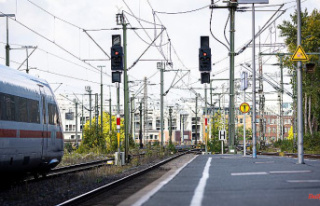The rising prices for gas and electricity are worrying consumers and the economy alike. However, the path to lower loads is controversial. There is still a lot to be done before a commission of experts can present its proposals for a gas price brake.
According to the SPD politician Katja Mast, the expert commission on the gas price brake has to solve a Herculean task. "Within a very short time, the leading experts from science, politics and business must make a proposal on how we can get the skyrocketing energy prices in the heating sector under control," said the first parliamentary manager of the SPD parliamentary group. The problem is complex because the energy suppliers lack the data basis for many of the models that are currently circulating.
It is also not easy to answer the question of how to curb the price but still get consumers to save. The chairmen of the commission had declared that they would work out a "resilient proposal" for a gas price brake over the weekend and then submit it to politicians. The traffic light coalition has announced a "defense shield" of up to 200 billion euros to support consumers and companies because of rising energy prices. A gas price brake could cap the prices for at least part of consumption in such a way that private households and companies are not overwhelmed.
Chancellor Olaf Scholz expects the experts to present their proposal on Monday. According to Mast, the Commission could revise its proposal later if necessary. "It is important for us that the proposals take effect quickly, because many citizens and companies are already under enormous pressure," she said. "In the best-case scenario, we should take into account the respective social situation of the consumers affected. If necessary, this can also be done in a second step with a differentiated model."
According to SPD leader Saskia Esken, Germany will get through the winter well with the planned energy price brakes. Esken told the editorial network Germany that they are powerful means of reducing consumer prices to a reasonable level. "Through joint efforts we will get through the winter well. We will not leave anyone alone in this difficult situation." This applies to consumers and social institutions such as companies of all sizes.
Industry President Siegfried Russwurm called on consumers to save energy despite the planned gas price brake. "There is no way around it," he said, according to the preliminary report of "Welt am Sonntag". The fact that the stores are more than 90 percent full is better than expected, but not enough. "Further purchases from the remaining sources are essential. But also saving." In addition, no price brake can undermine the world market. Gas prices would not drop to previous levels for the foreseeable future.
The head of the Verdi union, Frank Werneke, called for the gas price brake not to be set "unrealistically low". Residents of old houses could not regularly save more than 20 percent of consumption this winter, Werneke told the "Rheinische Post". "It is now important to make sure that the gas price brake - and by the way also the electricity price brake - does not become an air act."
The former EU Energy Commissioner and CDU politician Günther Oettinger criticized the traffic light coalition in the federal government for its actions in the energy crisis. "A lot of time is lost because the economics, environment and finance ministries don't cooperate well. First the gas levy, now the gas price brake, you can't govern like that," said the former Baden-Württemberg Prime Minister of the "Mannheimer Morgen". The EU has been observing with concern Germany's going it alone in energy policy for years. As examples, Oettinger cited the phasing out of nuclear power, the delayed expansion of the power lines from north to south and the phasing out of coal. "The Germans always have big visions, but the implementation doesn't work."












